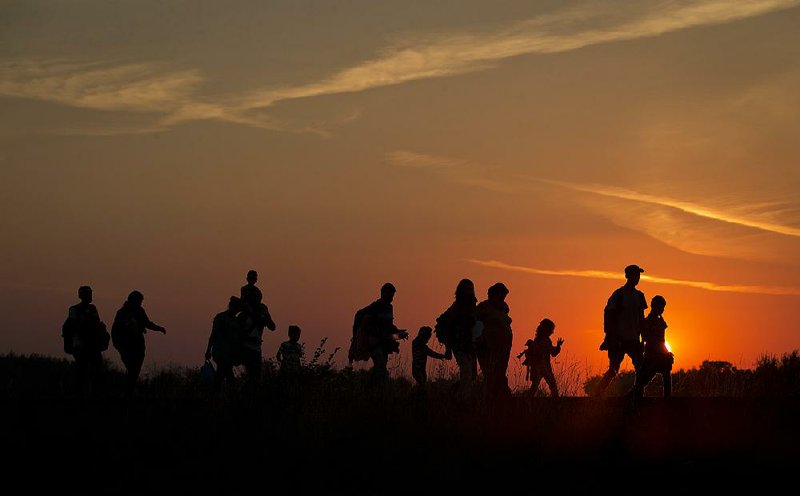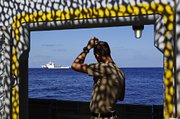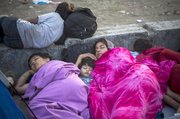PARIS -- The European Union's three biggest members urged the bloc to take quick action to cope with the wave of refugees and asylum-seekers and called for an emergency ministerial meeting on the crisis within two weeks.
Germany, France and the United Kingdom said in a joint statement Sunday that they asked Luxembourg, which holds the rotating presidency of the 28-member bloc, to summon EU interior and justice ministers to the special gathering to prepare concrete proposals for their next regular meeting in October.
Luxembourg announced later Sunday on Twitter that interior and justice ministers will meet in Brussels on Sept. 14 to discuss how to "strengthen the European response."
"What is happening at the moment is not just," German Chancellor Angela Merkel said at an event in Berlin on Sunday. "If Europe is a place of solidarity -- and we have also often shown our solidarity -- then we must on this question remain solidly united."
"We agree that we mustn't waste any more time," German Interior Minister Thomas de Maiziere said in an emailed statement. "The current situation requires immediate action and solidarity within Europe."
As the influx swells, EU governments are disagreeing on how to deal with Europe's biggest migration crisis since World War II. Countries such as Austria, Sweden and Germany, which faces 800,000 asylum requests this year, have called for sharing the burden throughout the EU, something others reject.
In their joint statement, Germany, France and the U.K. called for the creation of "hot spots" in Italy and Greece, by the end of the year at the latest, where migrants will be fingerprinted and recorded in a database. They also urged the creation of a list of countries to which migrants can be sent back safely if they don't qualify for EU refugee status, to enable better care in the EU for those who do.
"Those who flee wars, persecution, torture, must be welcomed with dignity," French Prime Minister Manuel Valls said. Europe needs a "unified" asylum policy that distinguishes between refugees, asylum-seekers and illegal migrants, he said.
"In order to help those who are in distress, we must also be able to tell those who aren't in this situation that they can't remain with us," Merkel said. "It's all dependent on being able to make this determination as quickly as possible."
Those who do need protection should be integrated more quickly "into our life," while those who don't should be sent home quickly, she added.
"In the long run, this is too much for Germany," de Maiziere said Sunday in Berlin of the projected inflow of 800,000 migrants this year. "That's why we need a European solution for a just distribution within Europe."
"To those who say we can't accept" any asylum-seekers, "I say: 'Yes, we can and we must, and if we do it in a smart way it'll even benefit us,'" de Maiziere said. "And those who say that all the weary and burdened can come to Germany because we're a rich country, to those I say: 'No, that's not possible. That overburdens even us.'"
Given the acute nature of the crisis, Merkel said she was working to secure the basic necessities needed to care for the thousands appearing on Germany's doorstep.
"Our most pressing problem now is for everyone to have a proper roof over his head or a warm tent with the winter months coming," Merkel said. "You can see that every day there are many, many more arriving."
French Foreign Minister Laurent Fabius on Sunday urged Hungary to tear down a razor-wire fence along its border with Serbia, and he scolded EU nations that refuse to take their share of the rising number of refugees, many of whom are fleeing war in the Middle East and Africa.
Hungary completed the border fence Sunday.
"When I see some countries in Europe that refuse quotas, I find this outrageous," Fabius said in a joint interview with Europe 1 radio, i-Tele, and Le Monde. "Hungary isn't respecting the common values of Europe" with the fence, and the EU must have a "severe" discussion with the country, he said.
Smuggling arrests
Germany, France and Austria sharpened their call last week for an EU-wide response to the migration crisis after the discovery on Thursday of 71 dead refugees in a truck near Vienna.
In Hungary, police said Sunday that a fifth man suspected of being involved in the deaths had been detained.
The Bulgarian was arrested Saturday evening, a police statement said. Police said they will seek to have him held in custody on suspicion of human trafficking, but gave no further details about him.
On Saturday, a court in the central Hungarian city of Kecskemet, where prosecutors say the truck departed, placed four other suspects under preliminary arrest pending possible indictment in the case.
Three Bulgarians and an Afghan were arrested Thursday in southern Hungary, after the truck with the dead migrants was found earlier that day parked along the Budapest-to-Vienna highway.
Austrian experts are performing autopsies on the victims -- 59 men, eight women and four children.
Austrian police have said the migrants likely suffocated. As of Sunday, 16 autopsies had been performed but there was no conclusive information on the cause of death, police spokesman Alexandra Hareter said. The process is expected to continue for several days.
The identities of the migrants remained unclear. Police have set up a hotline for people who may have information on who was aboard the truck and also are hoping for clues from examining cellphones found in the vehicle.
Investigators also found a Syrian passport in the truck.
"One can suspect that this was a Syrian group, or [that there were] a few Syrians," Burgenland province Police Chief Hans Peter Doskozil told the Austria Press Agency. "But it could be mixed. We don't know at this point."
Hungarian police detained 22 people suspected of human trafficking in several cases during the weekend. They detained nine Hungarians, seven Romanians, three Serbians and citizens of Austria, Lithuania and Poland.
Among the migrants found in vehicles were 160 Syrians, 21 Iraqis, 20 Afghans and two Pakistanis.
Romania's Foreign Ministry said Sunday that 26 Romanians had been detained in Hungary recently, suspected of human trafficking.
Police in Austria's Burgenland province, where the truck with the dead migrants was found last week, said Sunday that they arrested five suspected smugglers in four separate incidents in the previous two nights. The suspects -- three Hungarians, a Croat and an Italian -- had smuggled a total of 36 people into Austria, authorities said.
The Austrian government said it was stepping up checks in areas near the country's eastern border starting Sunday evening, and officials will stop and check large vehicles in which migrants could be hidden. The measures will remain in place until further notice.
Pope Francis urged people on Sunday to work together to stop crimes against migrants, including those who died in the truck.
Francis invited faithful in Vatican City's St. Peter's Square to pray silently with him for migrants who die "on their terrible journeys." He also prayed that God would "help us to cooperate effectively to impede these crimes, which offend the entire human family." Francis noted that Vienna's cardinal was in the square.
With Christians in Iraq, Nigeria and elsewhere fleeing persecution among the huge numbers of migrants, the pope implored the international community to "do something to put an end to the violence and abuses" of power.
At Budapest's Keleti train terminal, meanwhile, several hundred migrants protested at the terminal's main gate, demanding that Hungarian authorities allow them to travel to Germany.
Migrants applying for asylum after crossing over from the southern border with Serbia are registered by authorities and usually sent by train to refugee centers, passing through Budapest. They are supposed to stay in Hungary until their asylum requests are settled, but many, along with migrants who have avoided being registered, quickly try to go to richer EU countries, especially Germany.
Information for this article was contributed by Francois de Beaupuy, Rainer Buergin and Arne Delfs of Bloomberg News and by Geir Moulson, Pablo Gorondi, Alison Mutler and staff members of The Associated Press.
A Section on 08/31/2015



